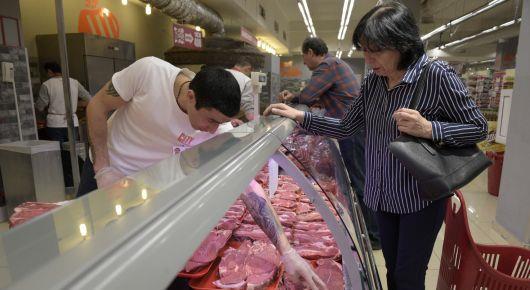FAO, WHO set an example of collaborative action for safe food with a systems approach

The enormous complexity of food production, trade, and consumption poses several challenges that require attention all along the food chain. Yet, when it comes to the consumer, all that matters is that the food we eat is safe and nutritious. To that end, a joint Food and Agriculture Organization–World Health Organization (FAO–WHO) virtual event today brought together relevant actors in Europe and Central Asia for World Food Safety Day, to discuss ways of improving food safety in the context of sustainable food systems.
World Food Safety Day focusses attention and provides an opportunity to raise awareness of the importance of food safety, demonstrate appropriate actions to prevent illness, and foster collaboration across sectors for improved food safety. Every year in Europe and Central Asia alone, over 23 million people fall sick from foodborne illness, burdening most heavily the poor and young. In addition, foodborne illness is responsible for 5 000 preventable deaths every year.
Understanding and reducing food-safety risks requires preventive measures and appropriate response mechanisms from the public and private sectors. The regional event for the 2021 World Food Safety Day also highlighted how the health of people, animals, and plants are inter-connected and may also be linked to food-chain risks.
“Food safety saves lives, enhances livelihoods, and helps to protect the planet; this is why it has always been a priority for our region,” said Vladimir Rakhmanin, FAO Assistant Director-General and Regional Representative for Europe and Central Asia. “It entails a collaborative effort and continuous dialogue between all actors and parties involved to let our food systems remain agile, and FAO is actively supporting this at different levels in the region.”
“The staggering number of individuals falling sick or dying after consuming unsafe food in our region is unacceptable,” said Hans Kluge, WHO Europe Regional Director. “We can do better and we need to do better – and one way of strengthening food safety is by sharpening our focus on the animal, human, and environment interface; COVID-19 being a grave reminder of that, deserving far greater attention.”
The COVID-19 pandemic has required public authorities and value chain operators to consider food-safety controls, in addition to other factors known to impact on the safety of our food supplies, such as the use of new and emerging technologies in food production, the complexity of international food trade, and climate change. Public authorities and food businesses need to take preventive measures and remain vigilant to react rapidly to all food-chain risks.
FAO and WHO jointly advocate for improved food safety through the development of food-safety policies and food-control practices, research, and monitoring and evaluation in a holistic, systemic manner. Examples of a systems approach to ensure food safety include the ‘One Health’ approach for minimising antimicrobial resistance and addressing zoonotic diseases, as well as ‘farm to table’ initiatives that aim to achieve sustainable production and distribution of safe and nutritious food, and minimise food loss and waste.
Policies and decisions need to be based on the best available science, data, and evidence. Efforts need to be stepped up to invest in ensuring the availability and accessibility of better data. With this in mind, the event promoted the sharing of applicable and actionable information and knowledge with various actors from the food systems in Europe and Central Asia. The FAO/WHO Regional Coordinating Committee for Europe is an important platform that allows for the exchange of experience and better communication across the region.
The recording of the event is now available on YouTube.
7 June 2021, Budapest, Hungary/Copenhagen, Denmark
